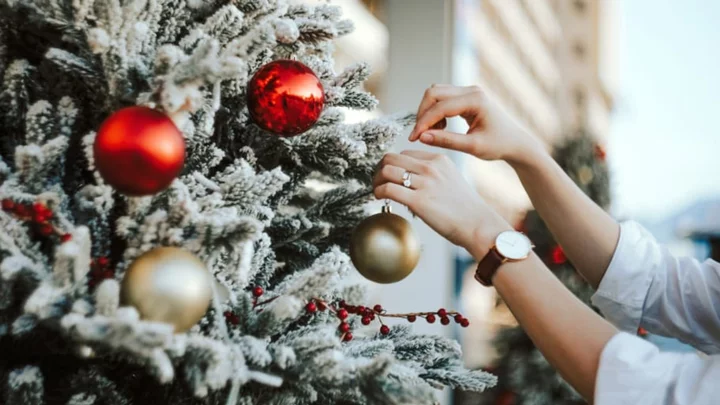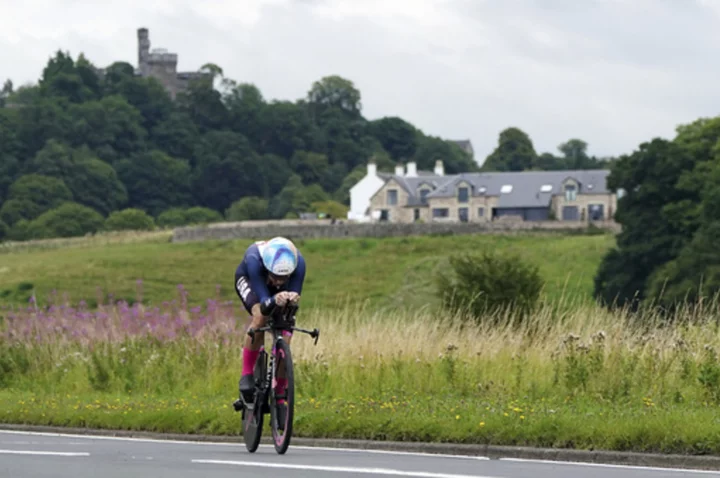Decorating a Christmas tree is a highly personal endeavor. Everyone has different preferences when it comes to tree size, ornament color, accents, and other decisions. But that doesn’t mean you can’t benefit from some basic strategies when making a seasonal scene. Whether you have a fresh spruce or an artificial trunk, here’s how to maximize your tree’s potential.
1. Hang your lights evenly. (And vertically.)
For a lot of people, managing to successfully untangle a ball of Christmas tree lights is enough to call it a day. But how you hang those strings is just as important. You can opt for a vertical hang, where the string goes up and down, or a horizontal approach, which involves wrapping the lights around the tree. Going vertical is easier, and making sure you keep a consistent distance between rows will help with visual appeal. As for incandescent bulbs and LEDS: the former may be cheaper, but the latter won’t burn hot and will likely last longer. (Either way, make sure you leave the lights off when you’re not home.)
As for how many lights you’ll need: One good rule of thumb is to shoot for 100 lights per foot. A 6-foot tree means 600 lights.
2. Figure out how many ornaments you’ll need.
A family’s ornament stash builds over time as more and more decorations are amassed. Too few ornaments and your tree will look sparse. Too many and it’ll look overstuffed. You can use an online ornament calculator like this one to try to figure out how many ornaments you’ll need in relation to your tree size.
Remember: While a 360-degree view of a tree might be nice, it’s easier to relegate it to a corner so you won’t have to worry about decorating the back. Consider that placement if you’re low on ornaments.
3. Consider flocking.
Flocking is the practice of dusting a tree with artificial snow for that premium winter look. In days past, people used flour and other pantry items. Today, you can buy commercial flocking packs that might use paper, corn starch, and a flame retardant for safety. If you go this route, though, take care when spraying your tree with water—it helps the flocking stick—and never do so around lights or other electrical decorations. You can also opt for artificial trees that come pre-flocked.
4. Fill in bare spots.
Some trees are overstuffed with branches, while others may resemble the sad thing that plagued Charlie Brown. If your tree is feeble-looking in spots, you can use pine garland or tinsel that resembles natural needles. You can also grab branches from the bottom of the tree to help plug in gaps higher up.
If you have an artificial tree, you might want to consider devoting time to fluffing it, or teasing the branches that have been compressed in a box all year. It’s time consuming, but you’ll wind up with a fuller-looking tree.
5. Size up your ornaments.
Ornaments come in a variety of sizes, and each is suited to a different position on the tree. Try to place your largest ones deep into the tree, where they can fill gaps and get support from where branches are strongest. (They’ll also reflect light, making the tree shine.) Smaller ornaments can hang closer to the end of branches.
You can make it even easier on yourself by grouping ornaments by size and color before you start hanging them so you won’t have to search for the right one.
6. Use ribbon.
A great way to add color to your tree is to opt for a bright ribbon, which also serves to cover up barren areas if you’re low on ornaments. While experts can use entire rolls of ribbon at once, you might be better served cutting a roll into sections of a few feet each. Start at the top of the tree—securing the tip if you have to—and then snake it around branches.
7. Stick to a theme.
There’s nothing wrong with some haphazard placement of ornaments, but the easiest tree on the eyes will be one that has some kind of unifying theme. That might be a color or ornament shape. Depending on your decorations, you might also be able to work toward a rustic or contemporary approach. For colors, try to stick to two or three—any more and you run the risk of things looking a little disorganized. (Unless, of course, that’s your theme.)
8. Measure your topper.
Tree toppers may be out of fashion for some, but decorating is a subjective activity. If you want an angel capping your tree, you won’t get fined. Just make sure it has the same shape: wider toppers go with wider trees, while narrow toppers are good for skinnier trunks. You also want to make sure it’s not too heavy or unbalanced. Decorating resource Balsam Hill recommends trying to balance a topper in your hand. If it topples over in 3 seconds or less, it’s probably going to sag.
This article was originally published on www.mentalfloss.com as Ornamental Health: 8 Tips for Decorating Your Christmas Tree.









